This is a look back at this week’s reading and painting.
Reading
Blogs
Recently, I have discovered Carolyn J Roberts’s – Fine Artist blog. Carolyn Roberts (@CRJFineArtist) took the decision six years ago to re-ignite her passion for art. I enjoy both her art and writing.
Another blog which has caught my interest is Vogel Wakefield’s – The counter-consultancy blog.
Articles
Martin Vogel (@martivo) writes in Conversations matters more that structure in organisations that “day-to-day interactions … are much more material to how things get done than the structures, strategies, documents and plans that people imagine to be their work.” Martin Vogel continues with: “One of the consequences of viewing an organisation as a thing is that managers … end up bringing the attitude they bring to other thing-like objects. Instead of relating to their colleagues as other human beings …, they implicitly treat them as constituent parts of a machine.” “It follows that one of the most critical skills for leaders is enabling in organisations the conversations that need to happen. This calls for approaches to facilitation that are mostly alien to managers accustomed to working with the organisation-as-thing analogy.”
Esko Kilpi (@EskoKilpi) writes in his article on We need to shift our focus from competencies to agency that “work corresponds with art through creative and contextual engagements.” Work is about “agency, human beings being … present for each other.” Esko Kilpi emphasizes that work is more about “exploration of solutions” than the “repetitive business processes we know so well, where inputs are … converted into outputs” in some “predictable” way. There are no “predetermined task sequences” that “guarantee success.” Work is “highly contextual”, and “requires interpretation” and “a new kind of agency.”
Esko Kilpi writes furthermore in his article on Complexity revisited that management theory is based on the assumption that the world can be “described and understood by identifying causal links: if I choose X, then it will lead to Y.” Esko Kilpi writes: “We try to model the world as predictable processes based on knowing how things are and controlling how they will be.” “We want things to appear orderly…, but what happens is inherently unpredictable.” “There is no linearity in the world of human beings. This is why our thinking needs to develop to something more applicable to sense making…” It’s about “being at the edge of chaos.” That is, being alive.
Another post I’ve read this week is the transcprition of Martin Fowler’s (@martinfowler) keynote, The State of Agile Software in 2018, at Agile Australia. Martin Fowler says: “It’s “values and principles that count”. People work “the best when they choose how they want to work.” “If you want to succeed in doing software development, you need to find good people. You need to find good people that work together at a human level, so they can collaborate effectively. The choice of what tools they use or what process they should follow is second order.” This is true for all knowledge work. (And all work is knowledge work.)
Books
I started reading Imagine Chicago: Then Years of Imagination in Action by Bliss Browne and Shilpa Jain, with contributions from Diana Tatarchuk and Yasmeen Basheeruddin, and a forward by Melinda Fine. I got this book via Skye Hirst (@autognomics). Bliss Browne writes in A Mother’s Story that she “assumed that people connect out of common interests or strengths”, but understood that “our most profound connection is based in a common vulnerability”. Our common bond is “to recognize and accept.” One thing that has emerged for her is to “think like a mother.” Bliss Browne interpreted this to mean that “it was not necessary to create anything, only to stay open and present to what would emerge naturally.”
Painting
The workweek saps my creative energy. I have discovered that relaxation kick in while painting. I spent Saturday exploring a motif from Falkenberg, Sweden. The challenge is to get depth in the painting without it getting cluttered.
This week I have also made a series of paintings from Lillåudden, Västerås, Sweden.
Final reflection
I started searching for life-giving ways of working seven years ago. Lately, I have realized that my searching is more about seeing than finding. The first years, I spent much time searching for solutions. For example by learning about sociocracy, which lead to the publishing of Sociokrati — En metod för självstyre in Swedish on Leanpub. A year later, I started my series of posts on organizing between and beyond, which is an inquiry into deeper generative order for organizing. Another shift happened this year when I started painting. It’s all about seeing!
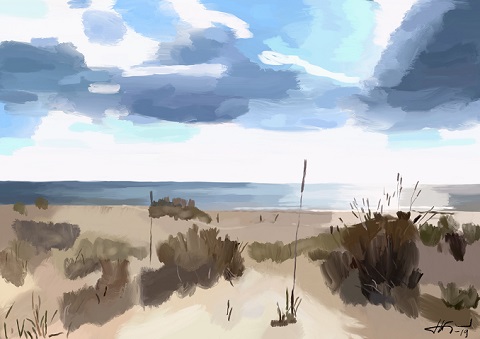
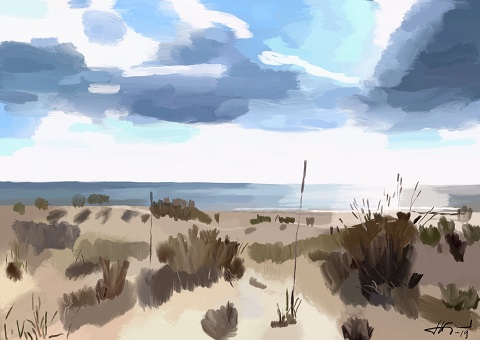
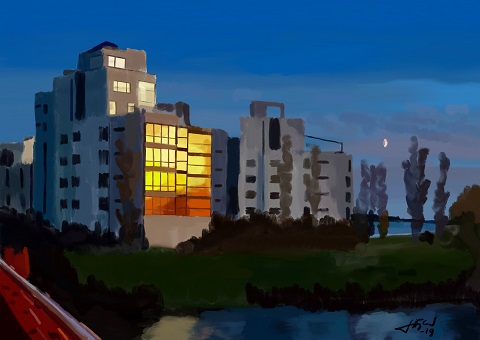
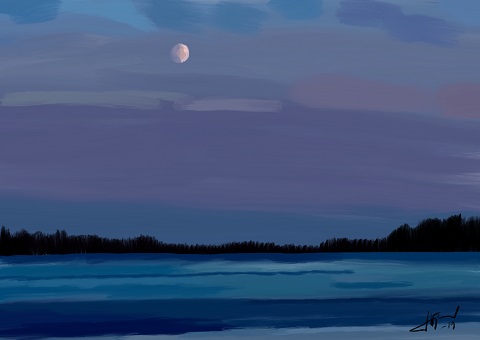
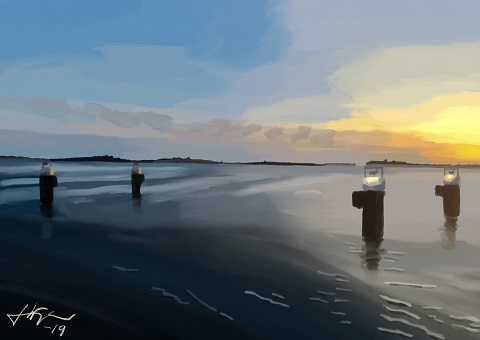
Leave a Reply
You must be logged in to post a comment.